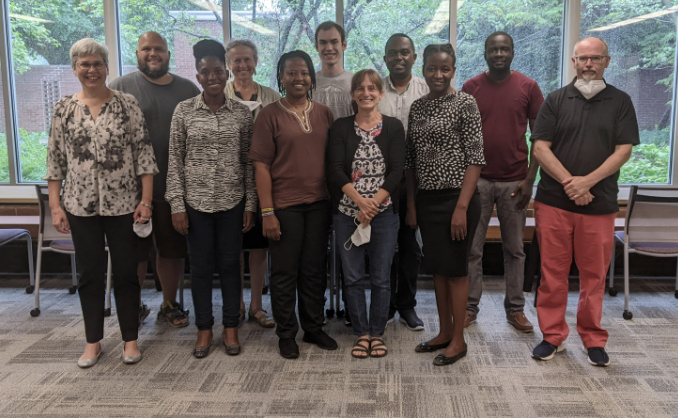Small college presidents are not typically involved in conducting original, on-the- ground research with students and faculty.
President Rebecca Stoltzfus is an exception.The research of President Stoltzfus focuses on the causes and effects of malnutrition in low-income women and children, particularly the integration of direct nutrition interventions with intersectoral initiatives such as infectious disease prevention, food safety and reproductive health.
She has approximately 150 peer-reviewed scientific articles to her credit.
In 2017, when she came to Goshen College from Cornell University, where she was the vice provost for undergraduate education and a professor of nutritional studies, she had two active grants: one with the National Institutes of Health and the other with the Bill & Melinda Gates Foundation. Both grants focus on the problem of fungal toxins in the food supply.
The research projects are in Zimbabwe and Tanzania and connect research teams in those countries as well as in Kenya and Germany and at three universities in the U.S.
“I have enjoyed bringing GC faculty and students into the research through common interests and methods,” Stoltzfus said.
“Paul Meyer Reimer, professor of physics, and John Mishler, assistant professor of sustainable agriculture, traveled with me to Tanzania for an investigators’ meeting,” she said. “I believe around six students have used our data for research projects in class or for Maple Scholars.”
As a professor, Stoltzfus helped to establish Cornell’s Global Health Program, which provides community-engaged learning opportunities for undergraduate students working on global health concerns with partners in Tanzania, Zambia, the Dominican Republic and India.
The programs are built on the principles of reciprocity and cooperation. They have resulted in creative methods for training Cornell students and local students as partners in service initiatives, research and policy case studies.
Stoltzfus acknowledges that experience makes her an asset to the GC community: “It means that I understand very well the joys and challenges of building a research program that involves mentoring students. I’ve been in the shoes of our faculty.”
Neil Detweiler, an assistant professor of biology and director of the Maple Scholars research program, said that Goshen College is fortunate to have a president-professor in leadership:
“Having a president with an active, multi-disciplinary research program is a huge asset to our institution. Dr. Stoltzfus’s project is an inspiration for students and faculty and an opportunity to get involved.”
Each year, GC students spend the summer doing intense study and research during the college’s eight-week Maple Scholars program. Each scholar is paired with a faculty member who serves as a colleague and supervisor.
“To have someone with such a prestigious research program and career like Dr. Stoltzfus to come to Goshen College also speaks highly of her passion for what we are doing here,” Detweiler said.
He believes that it is because of GC’s small and friendly environment that students can be successful: “Goshen College has a unique balance of a strong academic reputation with a strong sense of community. We challenge students academically, but we don’t have the elitism of some private liberal arts institutions.”
“When students start asking more and more questions in classes and getting involved in projects with professors, they start to become at high risk of getting Ph.D.s,” Detweiler said.
In September, Washington Monthly magazine ranked Goshen College as one of the best bachelor’s colleges in the state for six years in a row and No. 11 in the nation. Their rating factors include civic participation, research and social mobility.
The bachelor’s college rankings comprise around 250 colleges, which are described as “institutions that award almost exclusively bachelor’s degrees.” Goshen College received good grades from Washington Monthly in numerous categories, including graduation rate and research, which considers the percentage of students who go on to acquire doctorate degrees. But what makes GC students particularly interested in pursuing research careers in the first place?
“I suppose that some students come to GC already switched on to research and seeing themselves in that role,” Stoltzfus said, “but I give a lot of credit to GC faculty and how they weave research — crafting hypotheses, data collection, inference-making and research writing — into the curriculum here.”
“Students get inspired when they are curious about important questions and realize that they have the skills and methods to answer them.”
As for how the college nurtures curious minds, the vice president for academic affairs and academic dean, Ann Vendrely, said, “The main way is through the example of our faculty and their high expectations for students. Our faculty really believe that students can contribute to generating new knowledge and that is the foundation of research.”
“Faculty are an important resource,” she said. “They know their field and what is important preparation for graduate school in that area. Students should find out what is relevant research preparation for the field they are interested in pursuing because it is different across programs.”
Detweiler speculates that the Mennonite tradition could be a factor in shaping GC’s inquisitive nature: “In addition to the advantages of small class sizes and approachable faculty and staff, I wonder if the culture of nurturing curious minds at Goshen College comes partly from the culture of Anabaptists.”
“Knowledge and choice have always been a key part of Anabaptist beliefs and traditions,” he continued. “I think this has contributed to the culture of nurturing curiosity and involvement here at Goshen College.”
Stoltzfus said that research is part of cultivating joy at college:
“Research is hard but fun, and takes all different shapes and forms. It’s a disciplined way to seek answers to important questions.”




